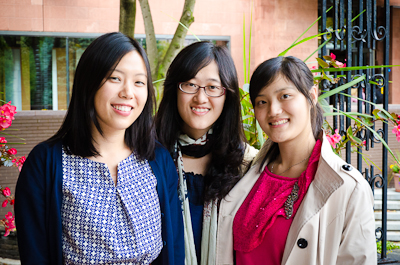The Faculty welcomes its first Chinese exchange students, and seeks to return the favour next year

Yiyun (Rayna) Wu and Yiran (Michelle) Wang, are third-year students at Fudan University Law School (FLS) in Shanghai, the fastest-growing city in the world and economic hub of mainland China. One of China’s elite institutions of legal education, FLS has established international exchange programs with eight leading foreign law Faculties, including Columbia, Harvard and, now, McGill.
In fact, Wu and Wang are the first students to take advantage of a new exchange agreement cemented by Dean Daniel Jutras during a 2011 visit to Asia, as described in our October 2011 issue.
After their first month at McGill, our first Chinese exchange students said they were managing their workload and adjusting well to life in Montreal. “It is getting better and better,” said Wu. “When we started, it was difficult because of the language barrier. All the terms in law! But we read a lot of materials and we got better at it.”
Law students at McGill have demonstrated a collegial hospitality to these two exchange students, particularly Rosel Kim, the Vice-President (Social) of the Asia-Pacific Law Association of McGill (APLAM). Indeed, Kim helped match Wang and Wu with ‘study buddies,’ law students who can mentor the exchange students and help them integrate into the McGill community.
Both Wang and Wu are enrolled in Banking law, Family law, Private international law and Evidence (civil matters) at the Faculty this semester. “We’re gaining lots of knowledge from the courses,” said Wu, though she is finding the curriculum quite different from what she is used to. “In China,” added Wang, “law students don’t choose a specific field—we study a wide range of basic courses, Chinese law history and some specialized optional courses. And then, we narrow our focus when we go to graduate school.”
During their exchange in Canada, the Chinese students have had opportunity to discuss differences between the legal systems in the two countries, a subject about which Wu plans to write an essay. “The legal system in Canada is more complicated than in China, which uses the same system in each province,” she says.
Though they will be returning to Shanghai before the worst of winter sets in, they are looking forward to experiencing their first Quebec snowstorm. “I am from Shanghai, so I haven’t experienced any cold weather yet,” said Wu. “But Michelle is from Qingdao, where it gets a little bit cold in winter. I think she may get used to the weather more easily.”
Next year, two McGill law students may find themselves in the opposite situation, as they swap a Montreal winter for the year-round heat of Shanghai. “We have exchanges established with Hong Kong University and the National University of Singapore, but this is the first exchange with mainland China, so it is pretty exciting,” said Kim.
“I think the Fudan exchange is a great opportunity for students to gain exposure to the legal system in China,” added Joel Kwan, President of APLAM. “China is the second economy in the world today, and is starting to take a more important role, notably in economics but also in world politics. There has been a lot of development in Chinese law. There are a lot of things we can learn there.”
Having completed a student exchange to Japan in 2007, Kwan feels that “above all, an exchange is an opportunity to have a cultural experience and to see how people do things differently in other countries. The whole purpose of our transsystemic program is to try to inculcate people into different traditions. When you consider all the legal traditions around the world, the possibilities are limitless.”
Stephanie Nowak agrees. Having been on exchange at Zhejiang University in Hangzhou, a smaller city near Shanghai, our Student Affairs Coordinator confirms that “Shanghai is an amazing place. The people are fantastic. The food is great. The city is beautiful, with old, Colonial buildings by the waterfront, juxtaposed with the extremely modern architecture of the metropolis. And it’s non-stop. It throws you off your feet, but in a good way, and makes you rethink everything you’ve ever learned. It’s what a transsystemic education is all about.”
At the last information session on student exchanges, Nowak noticed a lot of interest in China. “There’s buzz around it. Many students are considering going there.” To be eligible for exchange, students must be in third or fourth year, have finished their degree requirements, and have a minimum GPA of 2.7. While basic fluency in Mandarin is recommended, it is not essential. Exchange students will be able to choose from a dozen undergraduate law course offered in English, such as Comparative Law, International Commercial Arbitration, International Financial Law, International Investment Law and International Business Law from China’s Perspective. They will also be able to attend English-language courses from Fudan’s LL.M. Program in Chinese Business Law, which is geared to foreign students and professionals.
Nevertheless, warns Nowak, “the courses will be in English, but daily life will be in Mandarin. A working knowledge of Mandarin would make life a little bit easier. Students might consider taking a first-level Mandarin course this year. I would also highlight that a lot of people in China want to improve their English, and even their French, and would be more than willing to do a language exchange, either here or there.”
For more information on the Fudan exchange, students should drop in at the Faculty’s Student Affairs Office as soon as possible, as the deadline to apply is November 2, 2012.
– Story Bridget Wayland
– Photo by Lysanne Larose
